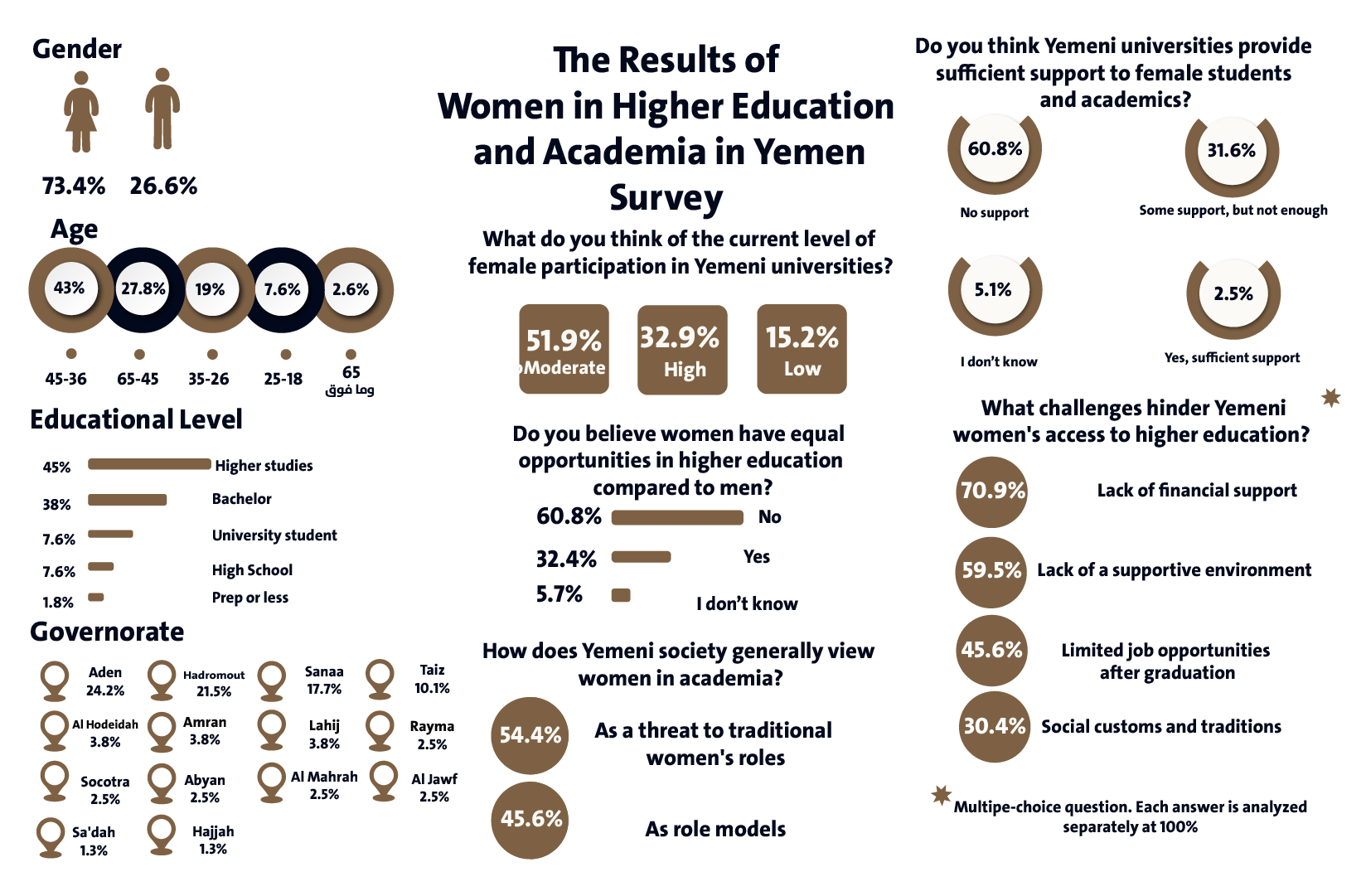Prepared by: Yomna Al-Zubairy
The journey of Yemeni women in higher education and academia is a long and arduous struggle, full of social, cultural, and economic challenges. Despite these difficulties, Yemeni women have achieved remarkable successes and are actively contributing to building and developing their society. But this wasn’t easy; it took huge sacrifices and unwavering determination in the face of strong opposition from conservative circles who believe a woman’s place is only in the home. However, Yemeni women have proven their competence and abilities, contributing effectively to various sectors – not just academia, but also politics, economics, and social spheres. Despite this progress, Yemeni women still face many challenges, most notably the ongoing conflict which has worsened humanitarian conditions and disrupted education. Gender discrimination and violence against women are also major hurdles. Other challenges for Yemeni women academics include a lack of suitable job opportunities after graduation, difficulty balancing work and family life, gender bias in performance evaluations, and a lack of sufficient financial and moral support.
Following this, the Information and Polling Unit at Yemen Information Center conducted a poll on women’s presence in higher education and academia in Yemen to gauge public opinion on the importance of women’s participation, the challenges they face, and the steps needed to increase their presence.
The poll surveyed 179 participants from across Yemen. Women made up the largest proportion of participants (73.4%), compared to men (26.6%). Participants were spread across different age groups, with the 36-45 age group representing the largest percentage (43%), followed by the 46-65 age group (27.8%). 19% were aged 26-35, 7.6% were 18-25, and only 2.6% were 65 or older.
In terms of education, those with postgraduate degrees were most represented (45%), followed by those with bachelor’s degrees (38%). 7.6% were university students, 7.6% had a high school diploma or less, and only 1.8% had a junior high school diploma or less.
The survey covered 14 Yemeni governorates, with Aden having the highest participation rate (24.2%), followed by Hadhramaut (21.5%), Sana’a (17.7%), Taiz (10.1%), and Al-Hudaida (3.8%). Also, 3.8% each of the participants were from Amran and Lahj governorates, 2.5% each from Rayma, Socotra, Abyan, Al-Mahra, and Al-Jawf governorates, and 1.3% each from Sa’ada and Hajja governorates.
Key Findings
First off, 51.9% of respondents felt that the presence of Yemeni women in higher education and academia is average, while 32.9% see their presence as significant, and only 15.2% consider it small.
Regarding equal job opportunities for women and men in higher education and academia, 60.8% of respondents believe that women’s opportunities are unequal and that they still face many problems, including gender discrimination. 32.4% felt otherwise, and only 5.7% said they had no opinion.
When asked about societal views of women with advanced degrees or working in academia, 54.4% of participants said it’s seen as a threat to the traditional role of women in Yemeni society. 45.6% said that women with advanced degrees or working in academia are positive role models for Yemeni women.
Regarding support provided by Yemeni universities to female students and employees, 60.8% of respondents said universities provide no support, while 31.6% said they provide some but insufficient support. 5.1% said they didn’t know, and 2.5% said universities provide adequate support.
Concerning the main challenges women face in accessing higher education in Yemen, respondents answered as follows:
- Lack of financial support: 70.9%
- Lack of a supportive environment: 59.5%
- Few job opportunities after graduation: 45.6%
- Social customs and traditions: 30.4%
In conclusion, the survey results highlight the importance of Yemeni women’s participation in higher education and academia. It also underscores the significant challenges they face despite their achievements, showing that public opinion recognizes women’s importance and has high hopes for their active participation in various fields. Empowering Yemeni women and providing them with equal opportunities in education and employment is an investment in Yemen’s future. Yemeni women have proven their ability to innovate and create, and they are capable of contributing effectively to building a more just and prosperous society.

